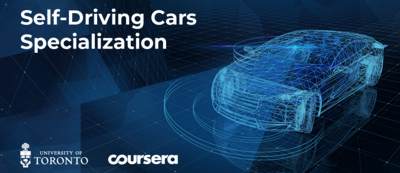| Coursera Self-Driving Car Specialization |
| Written by Sue Gee | |||
| Thursday, 31 January 2019 | |||
|
The University of Toronto has launched a four-course, advanced level specialization for those who want to be part of the autonomous vehicle revolution on the Coursera platform. The first course is available and the others will be rolled out over the next few months. In the blog post announcing the new partnership with the University of Toronto to train the next generation of autonomous vehicle engineers, Jeff Maggioncalda, Courseras CEO notes: By some estimates, we can expect to see over 20 million self-driving cars on the road by 2030, creating more than 100,000 new U.S. mobility industry jobs in the next decade. However, the major players in the self-driving car market guard their technology and advancements closely, making it difficult to gain access to the crucial knowledge needed to enter the field.
The new specialization provides an opportunity for online learners to benefit from the expertise of Professor Steven Waslander and Professor Jonathan Kelly who between them have more than 30 years of experience in autonomous robotics research and has an emphasis on safety while being based on the latest technology and research and is designed to enable more people to enter the AV industry. As Jonathan Kelly puts it: “Self-driving cars have the potential to increase road safety, lead to more efficient use of roadways and vehicles, and even reduce pollution. I think you’d be hard-pressed to find a more challenging engineering problem than designing robust self-driving cars. But that challenge is very exciting. It forces us to think about new ways of doing things. And the more people we have doing it, the greater our chances of success.” Udacity already offers two nanodegrees that we've reported on, the Intro to Self-Driving Cars Nanodegree and the more advanced Self-Driving Car Engineer Nanodegree, but this is Coursera's first offering in the area and is aimed at those interested in being "pioneers" in a fast-growing industry:
At advanced level being targeted at learners who already have some engineering experience but little to no formal training in self-driving technologies it comprises four modules, each of which can be completed in as little as a month:
The courses will teach learners how to assemble the full software stack required to define the operations of autonomous vehicles. The backbone of the learning experience is an open-sourced simulator called CARLA, which exposes learners to realistic driving conditions like extreme weather, varied lighting, pedestrians and more. By the end of the four-course Specialization, students will be able to drive a virtual car around a simulated racetrack. Upon completing the Specialization, learners can apply to in-demand jobs such as Autonomous Driving Software Developer, Autonomous Driving Engineer – Planning and Control, Autonomous Systems Test Engineer, as well as other popular roles, such as Computer Vision Specialist, Machine Learning Specialist, Deep Learning Specialist, Embedded Systems Engineer, and Robotics Software Engineer. Enrollment in open for all the courses and the first one is already underway. More InformationSelf-Driving Cars Specialization Related ArticlesCan You Build A Self-Driving Car In Six Months? Enrol Now For Udacity Intro to Self-Driving Cars Nanodegree Udacity's Self-Driving Car Engineer Nanodegree Driverless Cars Become Legal - The Implications Robot cars - provably uncrashable? To be informed about new articles on I Programmer, sign up for our weekly newsletter, subscribe to the RSS feed and follow us on Twitter, Facebook or Linkedin.
Comments
or email your comment to: comments@i-programmer.info |
|||
| Last Updated ( Friday, 01 February 2019 ) |




